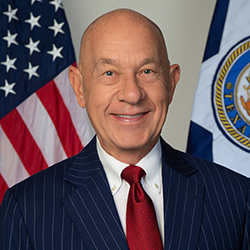Mayor John Whitmire stood Thursday afternoon on a stage in City Hall, alongside a screen with a bold proclamation.
“In Mayor Whitmire’s first term, Houston can be the first major city to end street homelessness,” it read. The word “can” was crossed out and replaced with the word “will,” in italics.
He had gathered with city officials, law enforcement officers and nonprofit leaders to outline his plan for how to do so.
The press conference was simultaneously a lofty vision statement, a fundraising pitch and a call for legislative changes that could create sustainable sources of funding and make it easier to commit people with mental illnesses who are living on the street.
Whitmire twice characterized the plan as involving both compassion and enforcement for individuals who may resist housing, citing a recent Supreme Court decision. The nation’s highest court ruled that homeless people can be fined and arrested for sleeping in public, even if there isn’t a shelter where they could sleep instead.
Houston has for years been viewed as a rare success story in the face of growing homeless populations across the country — since 2011, it has cut its annual count of people sleeping in shelters or on the street or in other places not meant for human habitation by more than two thirds. (The count does not include people who lack a home but are staying with friends or in hotels.)
But even as officials from other major cities around the nation have made pilgrimages to Houston in the hopes of finding a solution to their soaring homeless populations, many Houstonians have felt frustration with the number of people they see on the streets.
The city’s new plan tries to address those concerns by adding a new goal: Making sure everyone has a place to stay off the street.
“I’m here to declare today, you help the homeless by getting them off the street and reclaiming our public spaces,” Whitmire said.
The declaration marked a departure from the strategy taken by the city and its partners for over a decade, which focused limited funds on permanent housing, coupled with caseworkers. Mike Nichols, the city’s director of housing and community development, estimated that it cost $23,000 a year to provide such housing, compared with $35,000 a year for each spot provided by the city’s navigation center, a place where people stay between when their encampment is shut down and they secure housing.
Shelters are more expensive because they require staff and meals, among other services. But without them, police officers face difficulties responding to public complaints — where are people to go?
[…]
Houston’s homelessness strategy has long depended on influxes of federal disaster funding, such as the funds unleashed by Hurricane Harvey and the pandemic.
Now that $150 million of COVID-related funding that had channeled into the region’s homelessness response is winding down — at the same time that a budget crunch has caused the Houston Housing Authority to temporarily stop issuing vouchers used to pay for permanent supportive housing — the pace at which people can be moved off the street into housing has slowed.
Nichols said that the city would commit roughly $25 million “from various funding streams.” He hoped the county would contribute $20 million, and that he could get $10 million from other government sources. The Downtown District has contributed $1 million, and Whitmire said he expected other districts, such as Tax Increment Reinvestment Zones and management districts to contribute as well.
“We put $200 million into Memorial Park,” Whitmire said. “The Med Center, we spend billions.” He said he had been meeting with foundations across the city.
I hope this is as successful at getting people into housing as the prior efforts under Mayors Parker and Turner have been. One gets the impression from his quotes in this story that Mayor Whitmire is a little competitive about that, which is fine. Finding a reliable source of funding will be a challenge – for sure, one should not expect much if anything from the federal government for the next four years at least – as well as ensuring that there are enough places for the unhoused to go. The results will be the ultimate measure of that success. Houston Landing has more.


“The nation’s highest court ruled that homeless people can be fined and arrested for sleeping in public, even if there isn’t a shelter where they could sleep instead.”
Which is the most expensive and least effective way to deal with the problem. I’m surprised that Alito didn’t write an opinion praising debtors’ prisons.
I’ll make a prediction- if that detection camp gets built in South TX, somebody’s going to advocate for sending homeless people there.